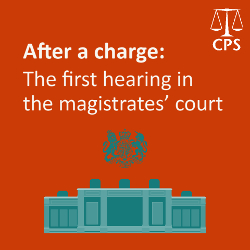At the first hearing, the magistrates’ court will decide whether the defendant should be released on bail.
Bail is when it is decided that the defendant does not need to be kept in prison before the trial. If a defendant is released on bail they are still required to come to court at each stage of the process but they won’t be held in prison between hearings.
If a defendant is not released on bail, they will be held in custody (in prison) until the trial.
The CPS prosecutor and the defence lawyer will present arguments to the court about whether the defendant should be granted bail. It is then up to the court to make this decision.
If a defendant is released on bail the court will often set out certain conditions that the defendant must meet to be allowed to remain on bail. The police will explain to you whether there are any conditions the defendant must follow and what they mean in practice. Bail conditions could include things like the defendant handing over their passport or being told not to contact you or go to the area where you live.
If a defendant breaks any of these conditions they may be remanded in custody (sent to prison) before the trial. If you have any information that suggests a defendant has broken one of these conditions or if you have any concerns at all you should get in touch with the police as soon as possible.
The police will keep you updated as to what happens at this hearing.
For an adult defendant the next step is the first hearing of the case in the Crown Court.

